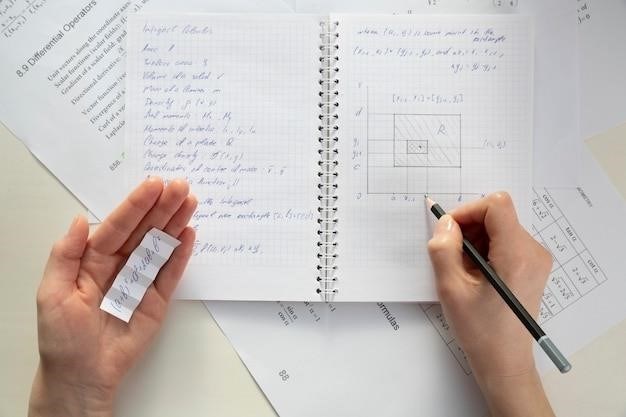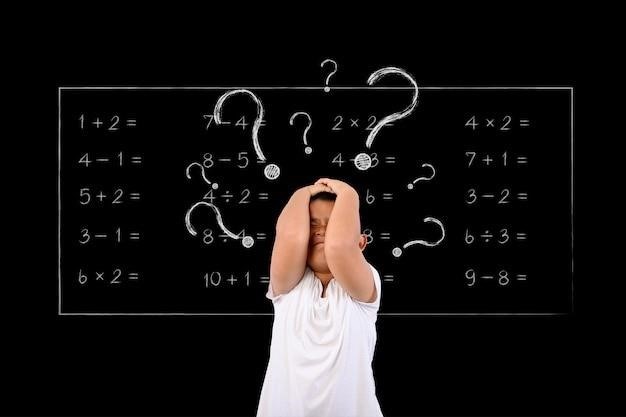Algebra Questions and Answers PDF⁚ A Comprehensive Guide
This guide offers a structured approach to mastering algebra. It covers fundamental operations, equation-solving techniques, and real-world applications. Access numerous practice problems and solutions in PDF format, categorized by grade level and topic, including Algebra 1, Algebra 2, precalculus, and calculus. Utilize online resources and practice tests to enhance your understanding and build confidence.
Finding Practice Resources Online
The internet provides a wealth of resources for algebra practice. Many websites offer free worksheets, printable PDFs, and online quizzes. These resources often cater to different grade levels, from elementary school to advanced calculus. Look for sites that provide detailed solutions and explanations, allowing you to understand the reasoning behind each step. Interactive online exercises can be particularly helpful for reinforcing concepts and identifying areas needing further attention. Some platforms offer personalized learning plans, adapting to your individual progress and highlighting weaknesses. Remember to check the credibility of the source before relying heavily on any particular website’s materials; reputable educational institutions or experienced educators generally offer higher-quality content. By strategically utilizing these online tools, you can significantly enhance your algebra skills and improve your understanding of the subject matter. Don’t hesitate to explore various options to find the resources that best suit your learning style and needs. Supplementing textbook exercises with online practice can lead to a more comprehensive and effective learning experience.
Free Worksheets and Printable PDFs
Numerous websites and educational platforms offer free algebra worksheets and printable PDFs. These resources are invaluable for supplementing classroom learning or independent study. Many worksheets are categorized by topic and difficulty level, allowing you to target specific areas for improvement. The availability of printable PDFs is particularly convenient for those who prefer a tangible format for practice. These downloadable resources often include answer keys, enabling self-assessment and immediate feedback. This allows for focused practice and identification of concepts requiring further attention. By regularly using these free resources, you can reinforce your understanding of key algebraic concepts and build confidence in your problem-solving abilities. The availability of diverse worksheets ensures that you can find materials that align with your specific learning style and curriculum requirements. Remember to utilize these free resources effectively; review answers carefully, understand the reasoning behind solutions, and seek help when encountering difficulties. This approach maximizes the learning potential of these readily available tools.
Grade-Specific Practice Materials
Finding algebra practice materials tailored to specific grade levels is crucial for effective learning. Resources designed for Algebra 1, for instance, focus on foundational concepts like linear equations, inequalities, and basic polynomials. These materials often incorporate age-appropriate examples and word problems, making the learning process more engaging and relatable. As students progress to Algebra 2, the complexity increases, introducing more advanced topics such as quadratic equations, functions, and logarithms. Grade-specific resources ensure that students are challenged appropriately, building upon previously learned concepts. Precalculus and calculus courses further expand upon these foundations, requiring a solid understanding of algebraic manipulation and problem-solving strategies. The availability of grade-specific practice materials allows students to work at their own pace, focusing on areas where they need additional support. This targeted approach enhances comprehension and helps students build a strong, sequential understanding of algebraic principles, preparing them for future mathematical challenges.
Algebra 1 Practice Problems and Solutions
Mastering Algebra 1 requires consistent practice and a solid understanding of fundamental concepts. Numerous resources offer Algebra 1 practice problems with detailed solutions, allowing students to check their work and identify areas needing improvement. These problems typically cover a range of topics, including solving linear equations and inequalities, working with polynomials, graphing linear functions, and understanding systems of equations. Access to well-structured practice problems and clear, step-by-step solutions is invaluable for building confidence and solidifying understanding. Many online platforms and textbooks provide such resources, allowing students to work through various problem types at their own pace. The availability of solutions allows for self-assessment and independent learning, enabling students to pinpoint misconceptions and address them proactively. This targeted approach enhances comprehension and promotes a deeper understanding of the underlying principles of Algebra 1, forming a solid foundation for more advanced mathematical studies.
Algebra 2 Practice Problems and Solutions
Algebra 2 builds upon the foundation established in Algebra 1, introducing more complex concepts and problem-solving techniques. Successful navigation of Algebra 2 requires consistent practice with progressively challenging problems. Numerous resources offer Algebra 2 practice problems and solutions in PDF format, allowing students to test their understanding and refine their skills. These problems often incorporate topics such as quadratic equations, functions, conic sections, logarithms, and exponential functions. Working through these problems, with access to detailed solutions, allows students to identify their strengths and weaknesses. This self-assessment process is crucial for targeted learning and improved performance. The availability of comprehensive solutions provides opportunities for students to understand the reasoning behind each step, fostering a deeper comprehension of the underlying mathematical principles. This self-directed learning approach enhances problem-solving abilities and prepares students for more advanced mathematical coursework.
Precalculus and Calculus Algebra Practice
Precalculus and calculus courses demand a strong foundation in algebra. Proficiency in algebraic manipulation, equation solving, and understanding of functions are essential for success in these advanced mathematics courses. Many precalculus and calculus textbooks include extensive algebra review sections and practice problems, often available as supplemental PDFs. These resources are invaluable for students needing to refresh their algebraic skills or address specific weaknesses. Online resources also offer a wealth of practice problems, focusing on the algebraic concepts most relevant to precalculus and calculus, such as manipulating complex expressions, solving systems of equations, and working with functions. Focusing on these specific algebraic skills helps bridge the gap between introductory algebra and the complexities of higher-level mathematics. Regular practice with these problems, coupled with a clear understanding of the underlying principles, enables students to develop the necessary algebraic fluency for advanced mathematical studies. This targeted practice is key to building a robust foundation for success in precalculus and calculus.
Practice Exams and Quizzes
Practice exams and quizzes are invaluable tools for assessing your understanding of algebra concepts and identifying areas needing further attention. Many textbooks offer sample exams in PDF format, complete with solutions, allowing for self-assessment and targeted review. Online platforms provide a wide array of practice quizzes, often categorized by topic, difficulty level, and specific learning objectives. These quizzes offer immediate feedback, highlighting strengths and weaknesses. Utilizing these resources effectively involves more than simply completing the quizzes; it’s crucial to analyze mistakes and revisit the relevant concepts. Understanding the reasoning behind correct and incorrect answers is vital for solidifying knowledge. Regularly working through practice exams and quizzes helps students become more comfortable with the format and style of typical algebra assessments, reducing test anxiety and enhancing performance. By simulating real exam conditions, these practice materials help students manage time effectively and develop strategic problem-solving approaches.
Online Resources for Algebra Practice
The internet offers a wealth of online resources for algebra practice, expanding beyond traditional textbooks and worksheets. Many websites provide interactive exercises, allowing for immediate feedback and personalized learning paths. These platforms often adapt to a student’s performance, offering more challenging problems as proficiency increases. Some websites offer video tutorials explaining complex algebraic concepts, breaking them down into manageable steps. These videos cater to various learning styles and can enhance understanding where written explanations might fall short. Furthermore, online forums and communities provide opportunities for students to connect with peers and instructors, seeking clarification and exchanging problem-solving strategies. These interactive elements foster a collaborative learning environment, complementing individual study. However, it’s crucial to evaluate the credibility and reliability of online resources, ensuring accuracy and alignment with established mathematical principles before relying on them for practice. Always cross-reference information with trusted sources.
Utilizing Online Practice Tests
Online practice tests offer a valuable tool for assessing your algebra skills and identifying areas needing improvement. Many websites provide timed tests simulating the pressure of an actual exam, helping you manage your time effectively under pressure. These tests often cover a broad range of topics, allowing you to gauge your overall understanding of the subject matter. Instant feedback, usually provided after completion, pinpoints your strengths and weaknesses, guiding your future study efforts. Some online platforms offer detailed explanations for each question, clarifying any misconceptions and reinforcing correct problem-solving techniques. Remember to choose reputable websites with accurate and relevant questions, avoiding those with outdated or irrelevant material. Regularly utilizing online practice tests can significantly boost your confidence and preparedness for upcoming assessments, transforming the learning process from passive absorption to active engagement and evaluation.
Understanding Fundamental Algebraic Operations
Mastery of algebra hinges on a solid grasp of its fundamental operations⁚ addition, subtraction, multiplication, and division. These operations, while seemingly basic, form the building blocks for more complex algebraic concepts. Understanding how these operations interact with variables and constants is crucial. For instance, combining like terms through addition and subtraction simplifies expressions, while the distributive property clarifies multiplication’s role in expanding expressions. Division plays a critical role in solving equations, isolating the variable to find its value. Each operation has specific rules and properties that must be understood and applied correctly. Practice is key to internalizing these operations and their nuances; consistent work with various examples ensures proficiency, laying a strong foundation for tackling more advanced algebraic challenges. Without this foundational understanding, progress in algebra will be significantly hampered.


Solving Algebraic Equations⁚ Step-by-Step Guides
Solving algebraic equations involves a systematic approach to isolate the unknown variable. Step-by-step guides are invaluable tools for this process. These guides typically begin by simplifying the equation, combining like terms, and applying the distributive property where necessary. Then, the goal is to isolate the variable using inverse operations. Addition and subtraction are reversed by performing the opposite operation on both sides of the equation. Similarly, multiplication and division are undone by performing the reciprocal operation on both sides. The order of operations (PEMDAS/BODMAS) dictates the sequence of actions. Parentheses or brackets are addressed first, followed by exponents, then multiplication and division (from left to right), and finally, addition and subtraction (from left to right). Consistent application of these steps ensures accurate solutions. Numerous online resources and textbooks provide detailed examples and practice problems, guiding students through the process and allowing for reinforcement through repeated practice. Understanding these step-by-step procedures is fundamental to success in algebra.
Real-World Applications of Algebra Problems
Algebra, often perceived as abstract, is surprisingly applicable to numerous real-world scenarios. Understanding its practical applications enhances comprehension and motivation. Consider calculating the area of a triangular flower bed, a problem easily solved using algebraic formulas. Financial planning, a crucial life skill, heavily relies on algebra. Determining interest earned on savings accounts or calculating loan repayments involves algebraic equations. In physics, algebra is fundamental for understanding motion, forces, and energy. Calculating speeds, distances, or the trajectory of a projectile requires applying algebraic principles. Similarly, in engineering, algebra plays a critical role in designing structures, analyzing circuits, or modeling complex systems. Even everyday tasks like calculating discounts, determining unit prices, or converting measurements involve algebraic concepts. By exploring these real-world applications, students can connect abstract algebraic principles to tangible situations, fostering a deeper understanding and appreciation for the subject’s practical relevance. This connection makes learning more engaging and meaningful, emphasizing algebra’s importance beyond the classroom.
